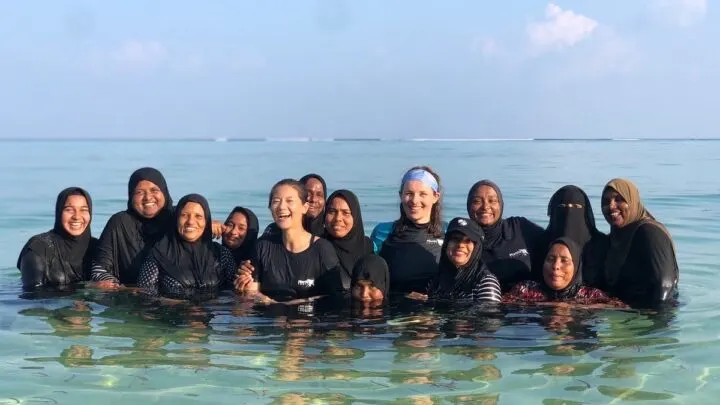Girls that Scuba are proud to be supporting the Manta Trust with their incredible campaign to empower women by giving them the opportunity to learn to swim.
Flossy Barraud, who developed the project, tells us more about the importance of women in island nations developing strong relationships with the water.
What made you love the ocean?
Was it an experience at the beach when you were a child, feeling waves crash against your feet? Perhaps it was your first snorkel, discovering a whole new world to explore? Most people begin to love the ocean through physically experiencing the magic of it.
Many of those people go on to become snorkellers, free divers, scuba divers, marine biologists, or even conservationists. Once you feel that pull of the ocean, you find a way to incorporate it into your life one way or another.
Protect What You Love
This ocean community generally cares about the protection of the ocean too. You protect what you love, and you love what you know. Nothing proves this sentiment more than the passionate global community of ocean-goers, many of whom start to eat more sustainably, reduce waste, or fight for the environment in their daily lives.
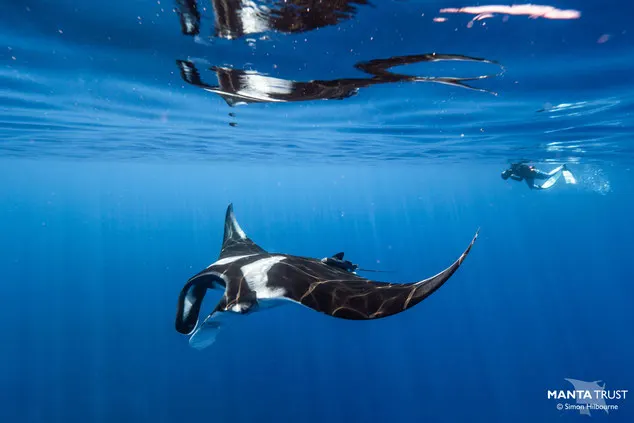
The Maldivian Manta Ray Project
The Maldivian Manta Ray Project (MMRP), founding project of the Manta Trust, have been researching and conserving manta rays in the Maldives since 2005.
Since 2015, we have been working with local communities, aiming to inspire the next generation of young Maldivians to pursue careers in ocean-based fields like diving, conservation, or environmental government jobs. Currently, a lot of these jobs are filled by foreign nationals.
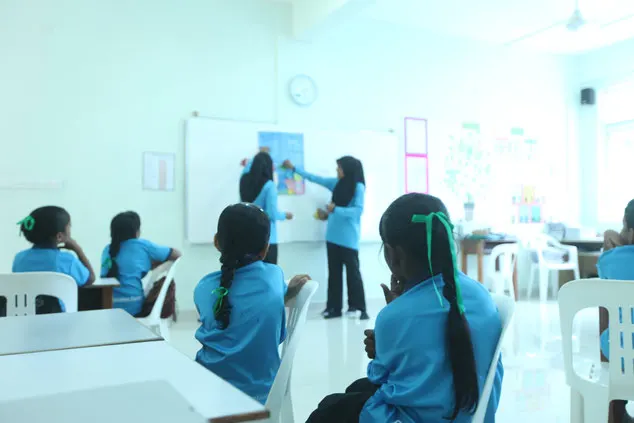
Community Outreach
We work with schools on local islands close to our research bases, teaching school children and other community groups about the ocean. We take them snorkelling on the local reefs and with the megafauna the Maldives is so famous for – including turtles, manta rays and sharks.
We focus on lighting that initial spark, witnessing again and again how much someone’s attitude towards the ocean can change after they experience it for the first time. Environmental or marine education is mostly absent from the school curriculum, so alongside other Maldivian NGO’s, we aim to fill this gap.
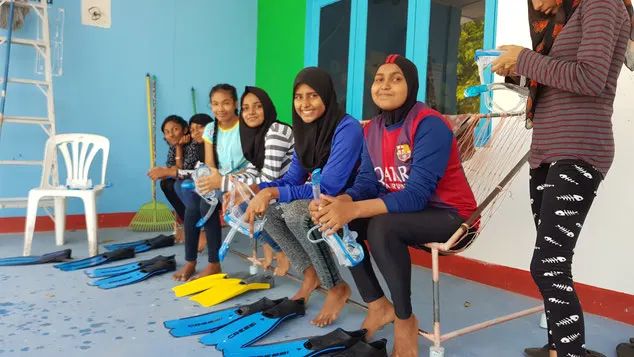
Women and the Water
We’ve noticed a key theme across islands and atolls – Maldivian women and girls often cannot swim and have never snorkelled or seen under the sea before. Our research shows that girls are 50% more likely than boys to have never snorkelled, and three times more likely to feel unconfident swimming in the sea.
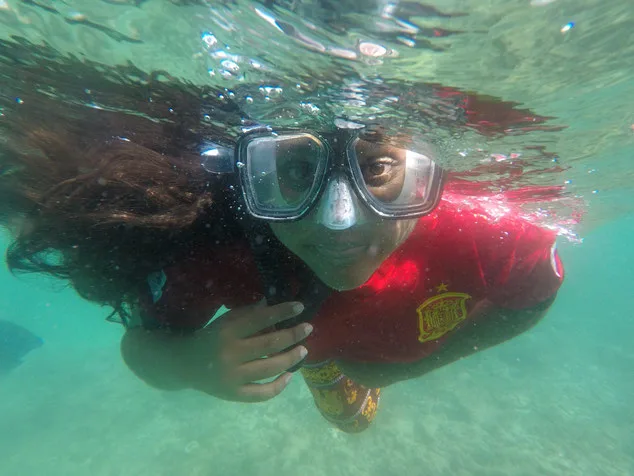
The Maldives is 99.3% ocean; most people live metres from the sea. Learning to swim is imperative not only for safety, but for enabling access to the dominant environment and core recreation and economic space; 50% of working Maldivians are employed in fisheries and tourism sectors. Hamda Ibrahim, a secondary school science teacher, highlights local concerns surrounding this:
“As Maldivians we all should know how to swim, but that is not the reality. Most of us are scared to go to the sea and do not possess the basic skills of swimming… As a teacher, I always think in terms of how this would help my students’ learning, and for my students I would say that their learning is very much limited because they don’t know how to swim.”
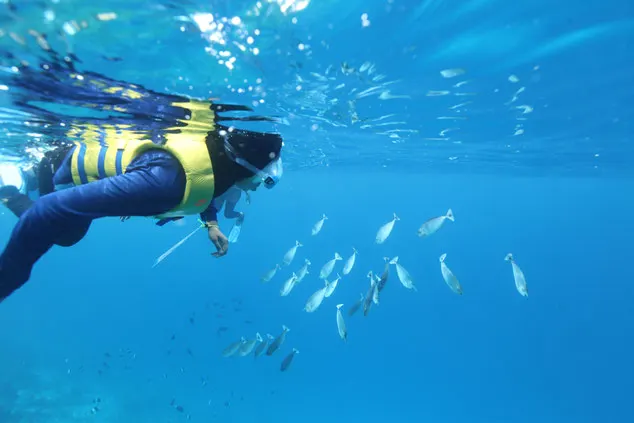
Accessing the Ocean
Since 2015, we have taught hundreds of children and women to swim and snorkel and witness the reefs or megafauna their country is famous for, for the first time. We have seen participants become passionate conservation advocates that strive to make changes in their communities.
When mothers learn, they instil their love for the ocean in their children, and a cycle of change begins. Girls that we teach have gone on to organise environmental clubs and events on their islands, and to pursue conservation careers.
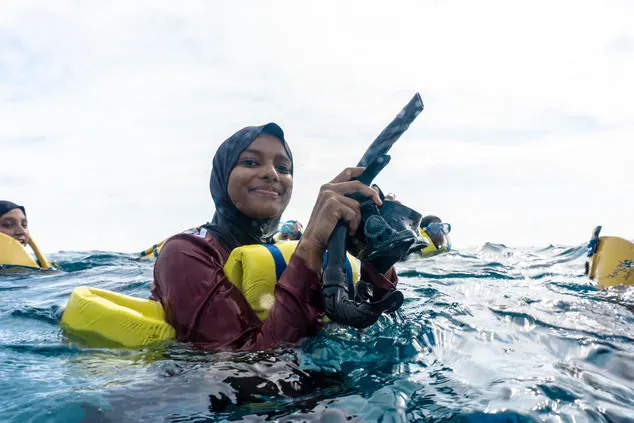
Saanee, one of our Moodhu Madharusa – Ocean School Marine Education Programme students, went on to win a Girls That Scuba scholarship for an online training course in coral reef ecology, and is now passionately pursuing a career in marine biology.
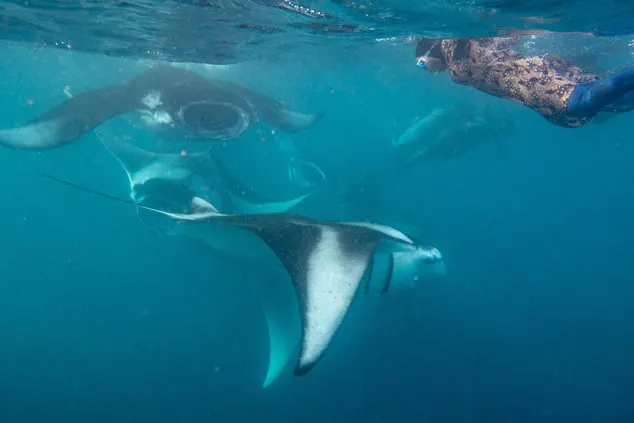
A Widespread Issue
This issue – women and girls not going in the ocean as much as men and boys – is not only existent in the Maldives, but in several other tropical nations that are highly dependent on their oceans for food, jobs, coastal protection and their economies.
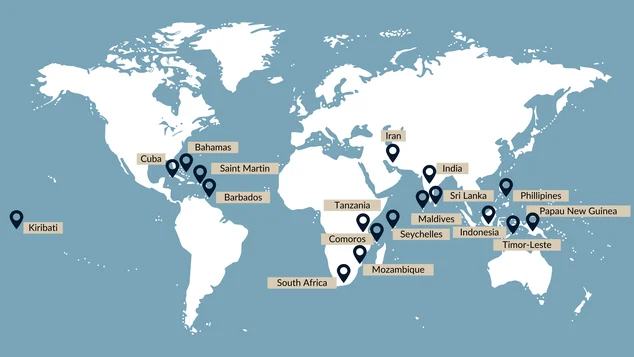
So, why don’t women go in the ocean as much as men? From discussions we’ve had with those living or working in over a dozen tropical nations around the world, we’ve learnt that the reasons vary widely but can include:
- Fear – Parents fear children drowning, so don’t let them swim. Often, the boys then learn when fishing with their fathers, or because they tend to break their parents’ rules more often.
- Perceptions – in many places, ocean-based jobs like diving, fishing, research, or conservation are widely perceived as jobs for men, so women don’t often pursue them. A lack of female role models deepens this issue.
- Cultural or religious norms – women aren’t permitted or encouraged to go in the sea.
- Skin colour – being in the sea means being in the sun. In many countries older generations discourage youth, especially girls, from going in the sea as they don’t want their skin to darken.
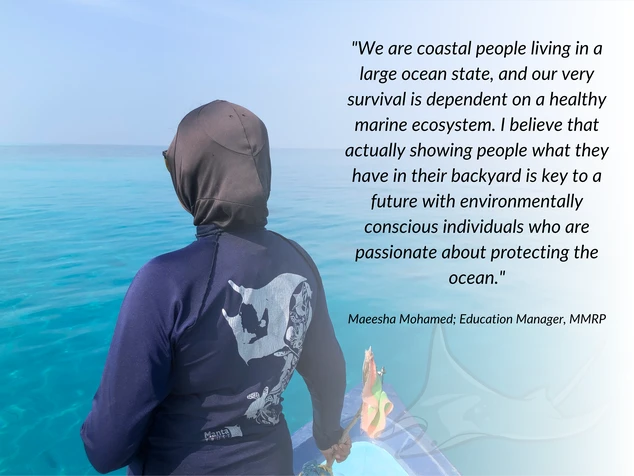
Ocean Access is Key For Effective Conservation
Citizens of these countries play a disproportionately large role in ocean conservation, as these countries often own large ocean areas that include some of the most pristine tropical marine habitats we have left.
Locally led conservation initiatives are crucial for achieving sustained and impactful conservation – ensuring people are able to connect to the ocean is an essential first step towards protection of these globally important areas.
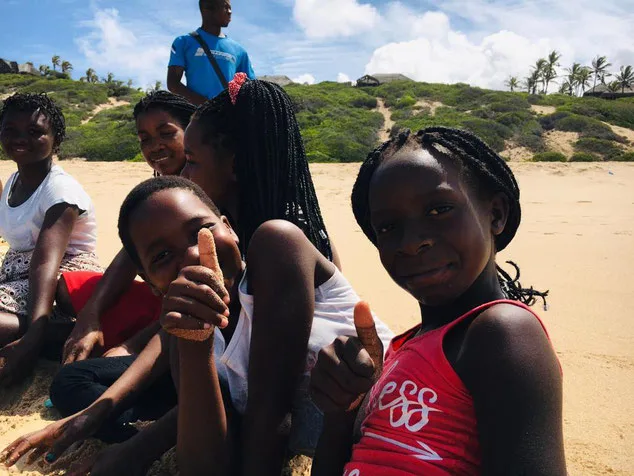
Many organisations have begun learn-to-swim and snorkel programmes, with incredible results for the small groups of people involved.
From these, we know that learning to swim, snorkel or surf has helped communities fight poverty in Mozambique, empowered women to become conservationists in the Maldives, improved wellbeing and challenged social and gender barriers in Cuba, Iran and Sri Lanka, and enabled women to access jobs in tourism and conservation sectors in Timor-Leste and Melanesia.
Women as Leaders
Research shows that women excel as leaders in conservation programmes and effectively pass knowledge onto younger generations but are often overlooked and have less educational opportunities than men.
Project Drawdown estimate that educating women, together with family planning, is the fifth most powerful solution for reducing emissions and mitigating the climate crisis.
Recognising the influential role of women in their families and communities, and enabling women to contribute further in these realms by empowering them through opportunities to access the ocean, could help to create more local ocean-stewards.
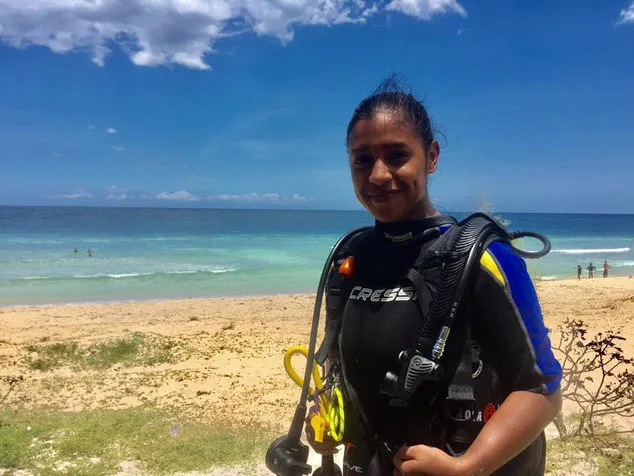
Empowering Women Through Ocean Opportunities
Although the projects listed above are hugely impactful, they are not widescale enough. Imagine what could happen if up to 50% of the population in these countries physically connected (or re-connected) to the ocean?
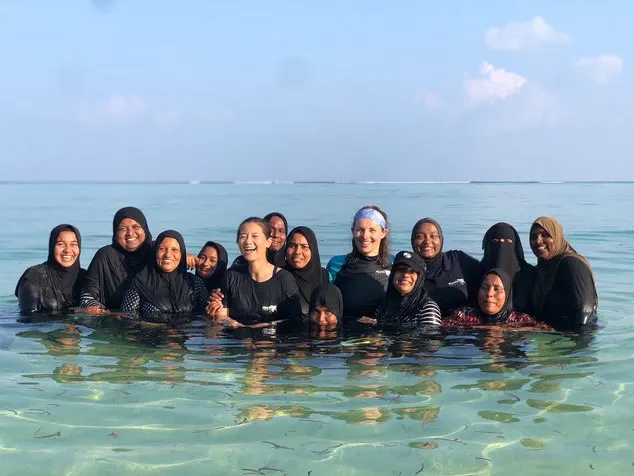
The Manta Trust and the University of Plymouth are launching a multi-year research project: Empowering Women through Ocean Opportunities. We will:
- Investigate and evidence the global scale and impacts of this inequality.
- Assess benefits of small-scale programmes underway and pilot new ones that enable women to access the ocean.
- Include case study sites such as Indonesia, Timor-Leste, Palau, Mozambique, Tanzania, the Bahamas, and/or Kiribati.
- Use information gathered to develop effective, community-led swim and snorkel training programmes that can be implemented in different communities and contexts worldwide.
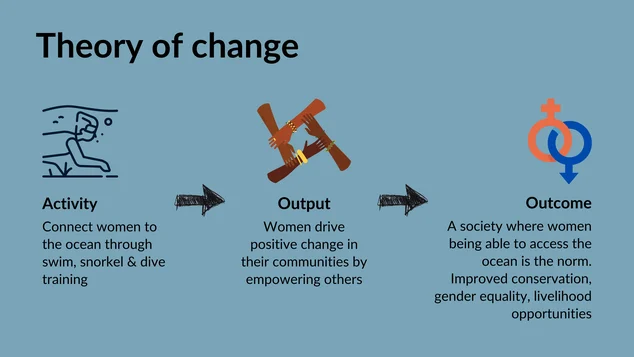
Empowering Maldivian Women as Swimming Instructors
Our key pilot project involves training Maldivian women as swim and snorkel instructors and working with local mentors and businesses to support them to train others in their community long-term.
Through this pilot, we aim to empower 26 Maldivian women to teach over 2% of the population, or over 10,000 people to learn to swim and go snorkelling by 2025.
This project will evidence the vast benefits of women engaging with the ocean and be used to upscale women’s ocean empowerment initiatives worldwide.
Find out more about this pilot and donate to the fundraiser here
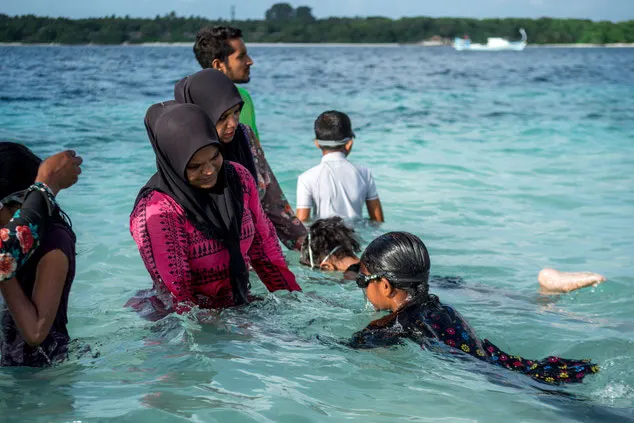
Get Involved
It all comes down to this – unless people connect with the ocean and are inspired to care, we will never manage to effectively protect the environment.
When the ocean is your backyard, being able to access it and to light that initial spark of love for it is crucial. We believe that this project could change thousands of people’s lives, and marine conservation, for the better. We thank Girls That Scuba for their work in this area and support of this project.
The Manta Trust are seeking collaborators and financial support for this part-funded project. If you are interested in collaborating with us, please get in touch with Flossy on [email protected]
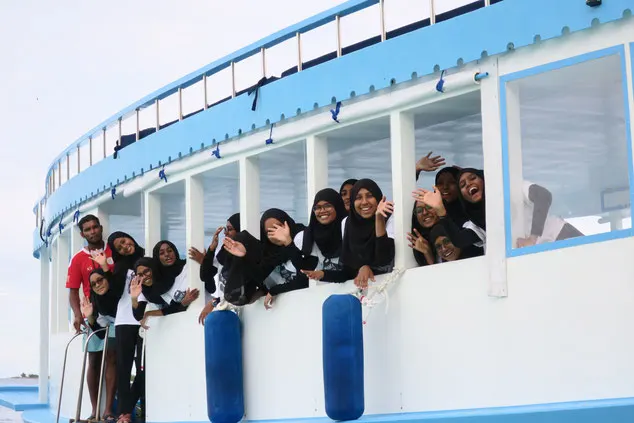
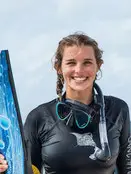
About the Author
Flossy Barraud developed this project in collaboration with the Manta Trust, during her four years working with Maldivian communities as the Manta Trust’s Education Manager. She is excited to be leading this project as a PhD with the University of Plymouth.

